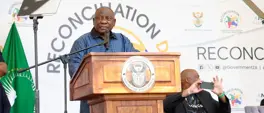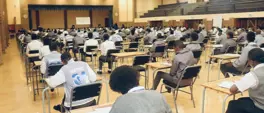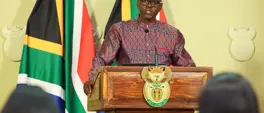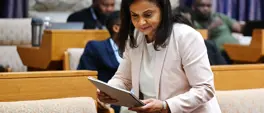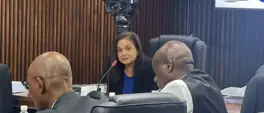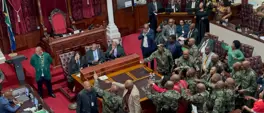MZWANDILE MASINA: Gigaba and Malema – a tale of a generation’s diminished greatness
Mzwandile Masina
25 July 2024 | 8:38In a different world, Gigaba and Malema should be at the pinnacle of political power in South Africa, but while both men are still active in the political space, it can’t be denied that the positions they occupy today are not a true reflection of their capabilities.
The late Professor Carl Sagan, an astronomer and planetary scientist, makes a profound observation about how human beings often come full circle in their understanding of life. Reflecting on the ways in which new generations distanced themselves from cosmic knowledge, only to later return to it, he states: “New generations grew to maturity wholly ignorant of the sky that had transfixed their ancestors and that had stimulated the modern age of science and technology. Without even noticing, just as astronomy entered a golden age, most people cut themselves off from the sky, a cosmic isolationism that ended only with the dawn of space exploration”.
Sagan was making the important argument that sometimes, younger generations disregard the wisdom of those who came before them, deeming it ancient and at times, even archaic. But with the passage of time, the value of that wisdom becomes apparent, leading to a Damascene conversion that sees them return to the source.
A few days ago, I found myself thinking about the words of Sagan as I observed two former African National Congress Youth League (ANCYL) presidents – Malusi Gigaba and Julius Malema – embrace one another after over a decade of having little-to-no contact. Gigaba led the ANCYL from 1996 to 2004, after which the reigns of the vibrant and militant youth wing of the African National Congress (ANC) would be taken over by Fikile Mbalula.
In 2008, at the end of Mbalula’s term of office, Malema was elected as the ANCYL president, a position that he would hold until his expulsion in 2012. Shortly thereafter, I would be appointed as the convener of a national task team mandated with taking the league to its next conference.
In a different world, Gigaba and Malema should, today, be at the pinnacle of political power in South Africa. There’s no question that Gigaba was groomed by the ANC and its leaders, including former president Thabo Mbeki, to someday play a greater role in the future of our country. And there’s no doubt too that Malema, under whom the ANCYL was at its most militant, had great potential to rewrite history.
It would have been a moment like no other in the history of African politics – a moment that would redefine the world. And while both men are still active in the political space, and are making important contributions in strengthening our democracy, with both as members of Parliament (MPs) and Malema as the president of the fourth biggest party in South Africa, it can’t be denied that the positions they occupy today are not a true reflection of their capabilities.
That Malema leads a party that recently haemorrhaged electoral support doesn’t reflect his abilities as a leader who can galvanise society, and young people in particular, towards the attainment of economic freedom in our lifetime. That Malusi sits in Parliament, a former minister who has held critical portfolios including Home Affairs and Finance, and not in Cabinet leading strategic decisions on the direction of our country as it negotiates its place in a volatile geo-political climate, reflects a profound loss for our generation.
But perhaps an even more important conversation is how two men who are a colossus of their generation, who were set to become the some of the most influential political leaders of our time, now find themselves far from the seat of power. Many explanations can be provided – but the most truthful of them is that Malema and Gigaba are victims of a political reality in which young people are sent to the slaughter by a generation of old men and women who are resistant to change.
Malema was expelled from the ANC for standing firm on the principle that African leaders must hold one another accountable – that problematic regimes do not have a place in an Africa that is seeking to redefine itself. Gigaba was hurled through the courts, made to account for administrative decisions and failures of due diligence by officials he led who were entrusted with protecting the interests of the State. The apex court would dismiss his attempts at exoneration, at demonstrating the rational basis upon which he made certain decisions, and the information that was at his disposal when he did.
While we must respect the decisions of the courts and protect a judiciary that is often unfairly attacked, there must be room to acknowledge that the courts can be wrong, that their absolutist posture implying that one error of judgment does not negate other truths. In both cases, there was an opportunity to impose sanctions aimed at rehabilitation and growth, rather than those aimed at ensuring erasure.
Linked to the issue of the old refusing to die is the reality that to stay alive, it must necessarily compromise the young, and in so doing, create a climate of volatility, mistrust, and distance among people who are natural allies. In South African politics today, many from this generation have severed ties. Comrades who grew up together in the movement, whose forged friendships over many years of struggle are, today, unable to call on each other.
The political divide that exists, often the result of them being forced into wars of old men, wars they didn’t start, makes it improbable to remain allies.
Gigaba and Malema have not had a relationship for over a decade and a half. They have barely greeted each other. To watch them warmly embrace, in an August House where they should be more influential than they are, was a deeply emotional moment for me as part of that generation. It was a reminder that much more was expected, and hoped for, from the two leaders. It was a reminder of how much South Africa has lost, and continues to lose, when leaders who should be working together sit on opposite sides, at war with one another.
The story of this generation of former ANCYL leaders is a cautionary tale to today’s youth, that a house divided from within cannot stand. It's a lesson that unless young people stand together, they will be written out of history, their legacies scattered in the wind, their dreams deferred, and the hopes that they carry for younger generations buried.
Mzwandile Masina is a member of the ANC National Executive Committee. He writes in his personal capacity.
Get the whole picture 💡
Take a look at the topic timeline for all related articles.
Trending News
More in Opinion

12 December 2025 15:34
CHARLES MATSEKE | The Republic of commissions arrives at its point of no return

12 December 2025 14:15
REBONE TAU | Ekurhuleni needs bold, decisive leaders to reverse years of capture

12 December 2025 05:13
MANDY WIENER | Searching for a superhero with a spine of steel: Why the position of NDPP matters so much



